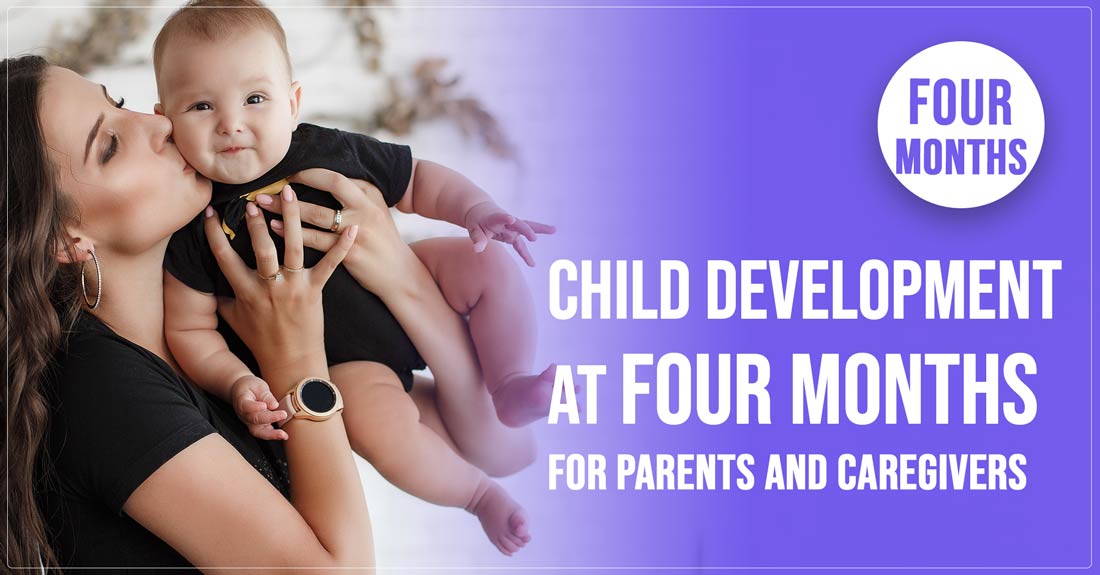Baby Milestones at 4 months!
Your 4-month old will be alert and aware of people and surroundings. Your baby has gone through significant developmental milestones and cognitive development, and you can relax and enjoy your baby’s company more than when they were a newborn. Although other parents may compare their baby’s development, it is best to take parenting tips with a grain of salt since each baby can be different.
4-MONTH OLD MILESTONES | FREE DOWNLOAD
Physical Development Milestones
Your baby’s doctor will likely use a baby’s growth chart to determine if your baby is healthy. The physicians will measure your baby’s head circumference and weight for length, height, and age at the doctor’s office.
Physical development milestones can be important for young children since they ensure they are healthy while significant changes are happening.
Baby Development – Mobility
At four months old, most babies have reasonable head control. They can even begin to roll over on their stomach or try to hold a toy. Many can lift their head and chest more frequently when laying on the tummy. By giving your baby tummy time, your baby will develop neck control and the muscles needed. Your baby might even try to bear weight on their legs by pushing themselves off any hard surface to try to get in a standing position or try to roll over on their back. You can support them while they stand for practice. Another important baby development is that they will be able to lift their head when they are held upright in a sitting position.
The increased mobility will also help your baby be more comfortable on soft and hard surfaces. Your young child will be able to sit contently for a more extended period with your support and roll over the bed. They will even find joy in kicking and waving their arms and legs.
Developmental Milestones – Vision & Hearing
At this age, babies can now focus more clearly on objects farther away, have color vision, and can see shades of yellow, red, and blue. Their eyes tend to draw to brightly colored pictures, moving objects, and more complex patterns during a child’s development.
Most children at this milestone also enjoy making eye contact with other people and are amused when they look at their reflection in the mirror or colorful toy. So if your baby likes to look at her own facial expressions or her reflection, you should get a toy like an unbreakable mirror.
When it comes to hearing, four-month-olds tend to repeat sounds from their parents or family members when they talk or say simple words. Although babies this age cannot understand actual words or sounds at this stage, they can speak in baby babble. They can even communicate hunger, happy emotions, and reactions through the babbling and sounds that the baby makes. They can also direct their attention towards voices and may be able to differentiate the word no, or their own name.

Child Development – 4-month-old Activity and Movement
When babies are four months old, they are more active and playful. They will reach for objects and toys and want to play. They also have increased hand-eye coordination at this stage and will be able to crawl to objects and grab them. This includes babies that will ‘gently pull’ on your necklace or hair if they are dangling within reach. In addition, 4-month-old babies enjoy studying objects more carefully while holding them, and they also begin to put everything in their mouths. Exploring new areas and examining items are an essential part of a child’s development.
Once they are older, they start to pass the time by playing with their fingers and hands. They also become more joyful and happily accept milk or food. In addition, 4-month-olds also laugh and giggle more than younger infants, and they start to enjoy the attention and your sounds. Though there are real words yet, they are practicing these skills by making cooing sounds and ‘blowing raspberries.
Allow your baby to lie on a hard surface with toys around and see if they grab them and try to move their body around. This is good fine and gross motor practice and will encourage good head control. They will likely be able to ‘play’ like this for a longer stretch of time than when they were younger.
Parents can help move their baby’s development milestones along by giving them toys such as a stuffed animal, unbreakable mirrors, and rattles. Toys will help your child develop their motor skills while making them feel safe and happy.
You can also encourage verbal communication by asking the baby questions and answering them yourself. Make sure to also listen intently as your baby talks.
FAQs – Frequently Asked Questions
Can My 4 month Old Baby Eat Solid Foods?
At 4 months of age, most babies consume a lot of breast milk or formula. However, many babies are becoming interested in eating solids as well. Although every baby has a different rate of development, 4-month-old babies are usually starting to be ready for actual food. By this age, babies are losing the tongue-thrust reflex that pushes the food out of their mouth and beginning to watch parents or siblings eat, and seem interested themselves. Watch to see if your baby is bringing their hands or objects to their mouth. Does your baby’s mouth open when you bring solids close? Do they babble and get excited when solid food is nearby? There are all signs they are ready to start feeding solids. Consult your healthcare provider if you want to start solids.
Good first foods include pureed or soft fruits, vegetables and gains.
How Can I Keep My Baby Safe From Diseases?
Disease control is an essential part of parenting a baby. The best way to keep your baby safe is to wash your hands regularly, wipe down any hard surfaces such as countertops, and keep your cell phone away from your baby. Cell phones are carriers of all sorts of bacteria that can harm your baby.
Although cleaning products are great for getting rid of germs, they can be harmful if kept within the infant’s reach. Make sure to baby-proof the house by hiding toxic liquids and chemicals to avoid any concerns.
How Long Should My 4 Month Old Baby Sleep?
Most infants get around 14 to 16 hours of sleep a day at this time. An infant will fall asleep multiple times during the day and take naps, but they should sleep through at least 6 hours of the night. Parents who have difficulty with a baby’s sleep should keep the bedtime routine regular.
When Should I Call a Doctor?
As parents, it is essential always to be following signs when it comes to your children. For example, if you think your baby might be sick or have ear infections, chances are you are right.
Talk to your doctor about possible development issues if your infant:
- only uses one hand to reach out
- keeps one fist closed
- has tight muscles
- doesn’t babble
- seems disinterested in people
- is not rolling from tummy to back yet
















